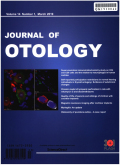- 钛学术文献服务平台 \
- 学术期刊 \
- 医药卫生期刊 \
- 五官科学期刊 \
- 中华耳科学杂志(英文版)期刊 \
Role of the periotic mesenchyme in the development of sensory cells in early mouse cochlea
Role of the periotic mesenchyme in the development of sensory cells in early mouse cochlea
基本信息来源于合作网站,原文需代理用户跳转至来源网站获取
摘要:
Objective: To investigate the role of the periotic mesenchyme (POM) in the development of sensory cells of developing auditory epithelium.Methods: Developing auditory epithelium with or without periotic mesenchyme was isolated from mice at embryonic days 11.5 (E11.5), E12.5 and E13.5, respectively, and cultured in vitro to an equivalent of E18.5's epithelium in vivo. Then, the explants were co-stained with antibodies targeting myosin VIIA, Sox2 and BrdU. Results: More hair cells in E11.5+7 DIV, E12.5+6 DIV and E13.5+5 DIV auditory epithelia were found upon culture with POM (225.90 ± 62.44, 476.94 ± 100.81, and 1386.60 ± 202.38, respectively) compared with the non-POM group (68.17 ± 23.74, 205.00 ± 44.23, and 1266.80 ± 38.84, respectively). Moreover, regardless of developmental stage, the mesenchymal tissue increased the amount of cochlear sensory cells as well as the ratio of differentiated hair cells to total sensory cells. Conclusions: The periotic mesenchyme promotes the development of cochlear sensory cells, and its ef-fect depends on the developmental stage of the auditory epithelium.

推荐文章
Mantle plume: the dynamic setting of the origin of Early Paleozoic mafic dykes in Ziyang, Shaanxi Pr
Early Paleozoic
Dolerites
Geochemistry
Origin
Mantle plume
Age and geochemistry of Early Ordovician A-type granites in the Northeastern Songnen Block, NE China
Early Ordovician
A-type granite
Songnen and Xing'an blocks
Geodynamic setting
Geochemistry and geochronology of Late Jurassic and Early Cretaceous intrusions related to some Au (
Yanshannian magmatism
Subduction-modified lithosphere
Au (Sb) deposits
Southern Anhui
South China
Heterogeneous Mg isotopic composition of the early Carboniferous limestone: implications for carbona
Seawater Mg isotopic composition
Limestone
Fossil
Micrite
Cement
内容分析
关键词云
关键词热度
相关文献总数
(/次)
(/年)
文献信息
| 篇名 | Role of the periotic mesenchyme in the development of sensory cells in early mouse cochlea | ||
| 来源期刊 | 中华耳科学杂志(英文版) | 学科 | |
| 关键词 | |||
| 年,卷(期) | 2020,(4) | 所属期刊栏目 | Research Articles |
| 研究方向 | 页码范围 | 138-143 | |
| 页数 | 6页 | 分类号 | |
| 字数 | 语种 | 英文 | |
| DOI | |||
五维指标
引文网络
引文网络
二级参考文献 (0)
共引文献 (0)
参考文献 (24)
节点文献
引证文献 (0)
同被引文献 (0)
二级引证文献 (0)
1998(1)
- 参考文献(1)
- 二级参考文献(0)
2003(1)
- 参考文献(1)
- 二级参考文献(0)
2004(1)
- 参考文献(1)
- 二级参考文献(0)
2005(1)
- 参考文献(1)
- 二级参考文献(0)
2006(1)
- 参考文献(1)
- 二级参考文献(0)
2007(2)
- 参考文献(2)
- 二级参考文献(0)
2008(1)
- 参考文献(1)
- 二级参考文献(0)
2011(2)
- 参考文献(2)
- 二级参考文献(0)
2012(1)
- 参考文献(1)
- 二级参考文献(0)
2013(2)
- 参考文献(2)
- 二级参考文献(0)
2015(3)
- 参考文献(3)
- 二级参考文献(0)
2016(1)
- 参考文献(1)
- 二级参考文献(0)
2017(5)
- 参考文献(5)
- 二级参考文献(0)
2018(1)
- 参考文献(1)
- 二级参考文献(0)
2020(1)
- 参考文献(1)
- 二级参考文献(0)
2020(1)
- 参考文献(1)
- 二级参考文献(0)
- 引证文献(0)
- 二级引证文献(0)
引文网络交叉学科
相关学者/机构
期刊影响力
中华耳科学杂志(英文版)
主办单位:
解放军总医院耳鼻咽喉科研究所
出版周期:
季刊
ISSN:
1672-2930
CN:
11-4883/R
开本:
出版地:
北京市复兴路28号
邮发代号:
创刊时间:
语种:
eng
出版文献量(篇)
450
总下载数(次)
0
总被引数(次)
399
期刊文献
相关文献
推荐文献
- 期刊分类
- 期刊(年)
- 期刊(期)
- 期刊推荐

 免费查重
免费查重










